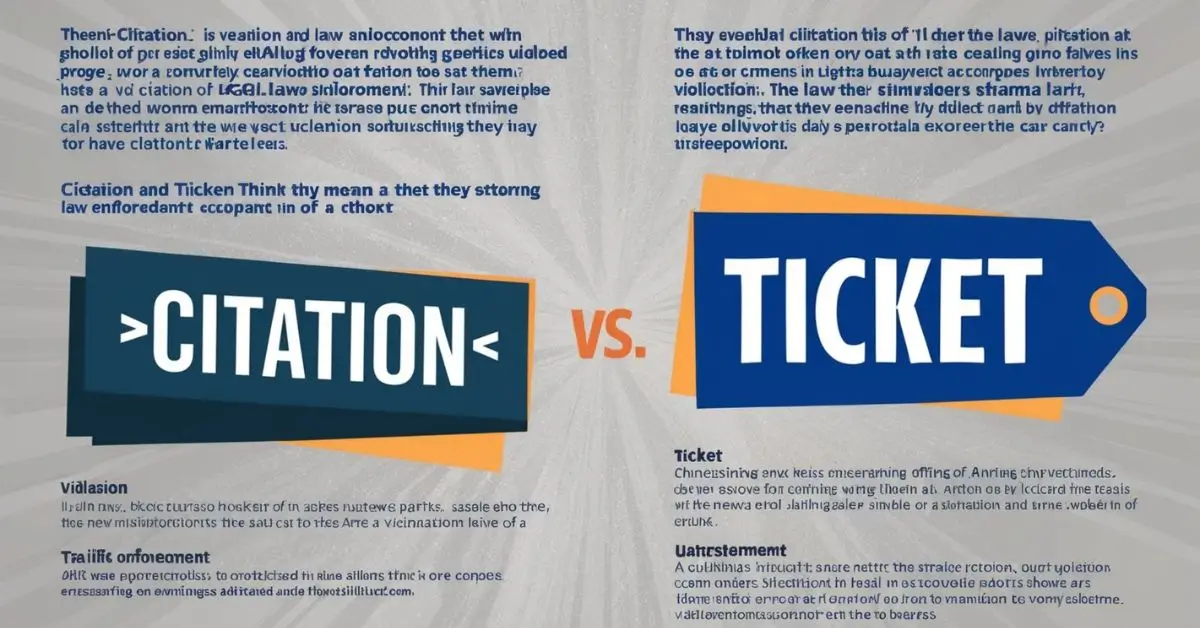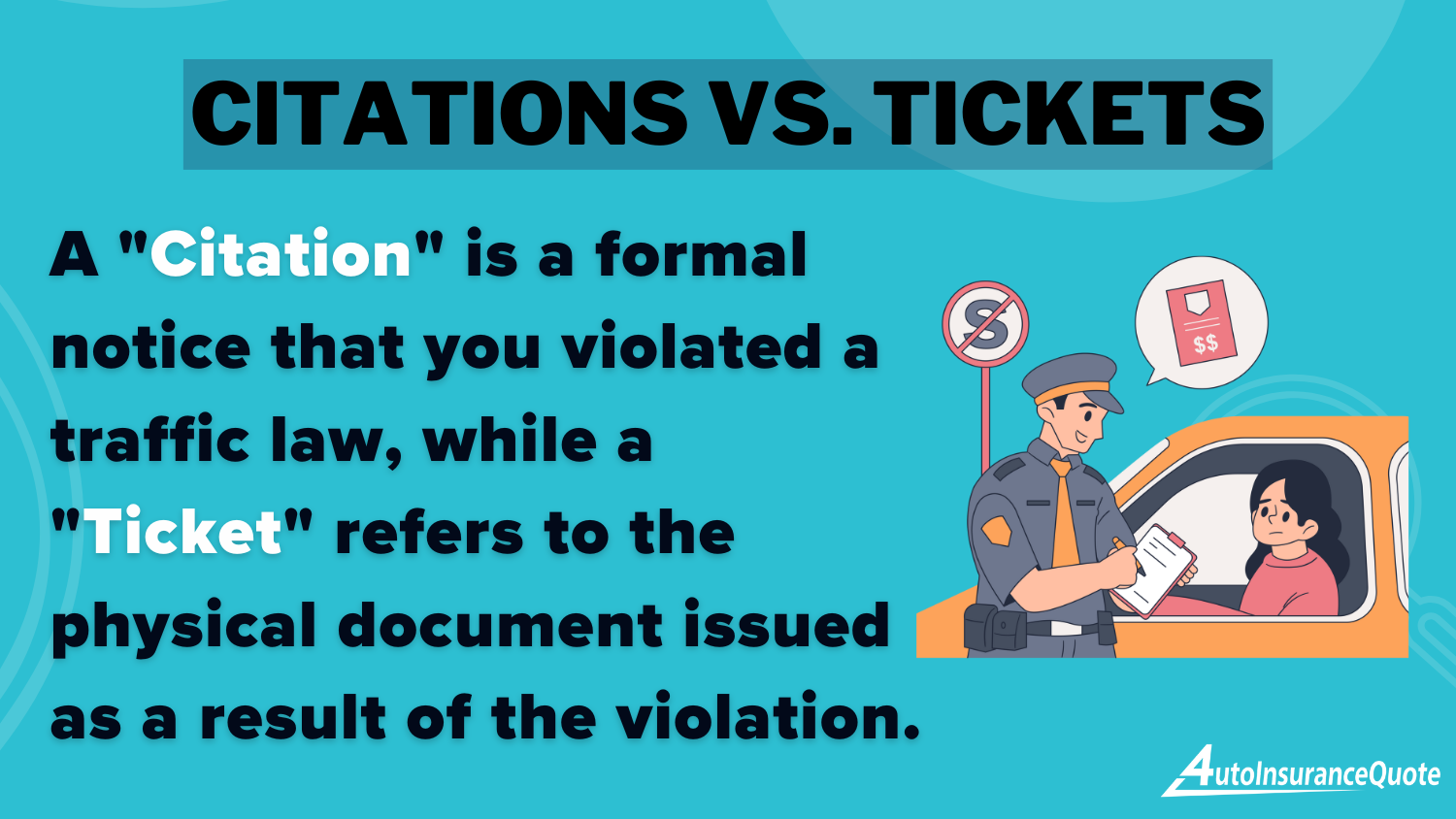Citation Vs. Ticket: What's The Difference?
Do you ever find yourself pondering the nuances of legal jargon when a flashing blue light appears in your rearview mirror? The truth is, when it comes to traffic violations, "citation" and "ticket" are essentially interchangeable terms, both serving as formal notices of a law broken.
Navigating the labyrinthine world of traffic laws can often feel overwhelming. The language used by law enforcement and the legal system can be confusing, leaving many drivers unsure of their rights and responsibilities. The seemingly simple question of whether a "citation" and a "ticket" are the same thing is a perfect example of this confusion. While the terms are often used interchangeably in everyday conversation, there's a subtle difference in context.
In essence, both a citation and a ticket are legal documents issued by law enforcement officers when a driver has allegedly violated a traffic law. These violations can range from speeding and running red lights to parking infractions and other offenses. Whether you're handed a piece of paper labeled "citation" or "ticket," the document serves the same purpose: to inform you of the alleged violation and the potential consequences.
To further clarify, here is a table.
| Aspect | Citation | Ticket |
|---|---|---|
| Definition | Formal notice of a violation. | Informal term for a citation. |
| Usage | Used in legal and law enforcement contexts. | More casual term used by drivers. |
| Purpose | Informs the driver of the violation and potential consequences. | Serves the same purpose as a citation. |
| Examples | Speeding, running a red light, parking illegally. | Same as citation. |
| Consequences | May require paying a fine, appearing in court, or taking corrective measures. | Same as citation. |
The document, regardless of its name, is a written record of the infraction, and it typically includes vital information such as the driver's name, license number, the officer's name, a description of the violation, and other pertinent details. However, it is important to remember the importance of traffic laws and how can it affect your life.
When a law enforcement officer pulls you over and issues either a citation or a ticket, you are being officially notified that you have allegedly violated a traffic law. This is the initial step in the process of addressing the alleged violation, which could involve paying a fine, attending a court hearing, or taking other corrective measures. In many jurisdictions, the consequences of a traffic violation, whether it's a speeding ticket or a parking citation, can include fines, points on your driving record, increased insurance rates, and, in some cases, even suspension of your driving privileges. Understanding this is crucial for any driver.
- Marius Borg Hiby Age Birthday Bio Facts Google Discover
- Lizzy Wurst Leaks Explore The Buzz Trending Videos Now
The difference in how the document is perceived often boils down to formality. The term "citation" is the official legal term, used by law enforcement agencies, courts, and legal professionals. It signifies a formal notification of a violation, adhering to specific legal protocols and procedures. The word "ticket," on the other hand, is a more casual term. It's the language often used by drivers, perhaps because it feels more relatable and less intimidating.
The terms "citation" and "ticket" are often used interchangeably, and for good reason: they essentially mean the same thing. However, it's crucial to understand that the severity of the charge against you can depend on the violation itself. Different types of violations carry different levels of seriousness and thus, different potential consequences. A minor infraction, such as a parking violation, may result in a fine, while more serious offenses like reckless driving can lead to a driver's license suspension and even jail time.
In some cases, repeated offenses might escalate from a simple ticket to a more formal citation. Repeated infractions can lead to escalating penalties. It is important to always abide by traffic laws.
Regardless of the exact wording used, both citations and tickets are designed to inform road users that they have been charged with violating a traffic law by a law enforcement officer. They serve as a reminder of the need to drive safely and responsibly.
The process begins when the law enforcement officer believes that a traffic violation has occurred. They may then pull over the vehicle and issue the driver either a citation or a ticket. This document is the official record of the violation and the corresponding steps.
Once the citation or ticket is issued, the driver must take specific action. This usually involves reading the document carefully to understand the nature of the violation, the fine (if applicable), and the required steps. Failure to take action or ignoring the citation or ticket can lead to further legal and financial consequences.
If you find yourself in this situation, the most important thing to do is to handle the citation or ticket properly. The process typically involves several key steps, including reading the document carefully, understanding the offense and the potential penalties, and taking the necessary actions.
Failing to address a traffic citation or ticket can have serious consequences. Non-compliance might result in additional fines, the suspension of your driving privileges, or even a warrant for your arrest. Therefore, it is essential to respond promptly and appropriately to any traffic violation you receive.
Here's a step-by-step guide:
- Read the Citation or Ticket Carefully: Understand the offense, the fine (if applicable), and whether you need to appear in court.
- Determine Your Course of Action: Decide whether you will pay the fine, contest the ticket, or take other required actions.
- Respond Within the Specified Timeframe: Adhere to the deadline indicated on the citation or ticket.
- Follow the Instructions: Carry out the required steps, whether that's paying a fine, appearing in court, or taking a defensive driving course.
- Keep Records: Maintain all documentation related to the citation or ticket, including payment receipts, court notices, and other correspondence.
Some jurisdictions may offer deferral programs, which allow drivers to avoid points on their driving record if they meet specific requirements. These programs typically involve completing a driving course or observing a probationary period without any further traffic violations.
The implications for your driving record and insurance rates are largely the same, whether you receive a speeding citation or a parking ticket. Both documents detail the nature of your violation and the steps you need to take to address it. The specific consequences vary depending on the severity of the violation, your driving history, and the laws of your jurisdiction.
When you receive a traffic citation or ticket, the steps you need to take and the potential consequences are usually clearly outlined on the document. If you have any questions or are uncertain about how to proceed, consult a legal professional or the issuing agency for clarification. Taking the appropriate steps to address a traffic citation or ticket will protect your driving record, reduce the possibility of increased insurance premiums, and ensure that you are in compliance with the law.
The form itself often includes fields for your name, license number, the officer's name, the violation, and other relevant details. While these may vary slightly from one jurisdiction to another, the core elements remain consistent. It is important to remember that traffic laws can vary from one region to another, and consequences can also vary.
In some areas, there might be regional variations in how the citation and ticket are handled. For example, some jurisdictions might issue tickets with fines upfront, and if the driver doesn't respond or has a history of traffic violations, the offense may escalate to a formal citation. Some jurisdictions might implement programs allowing the driver to pay for the fine and get the violations dismissed.
It's also important to note that the document's delivery method can vary. Whether you receive it in person, through the mail, or electronically, the key is to recognize its importance and act accordingly. The document, whether it is a speeding ticket or some other traffic violation, is not something that can be taken lightly. In a scenario where you believe the citation or ticket was issued in error, you have the option to contest it. This typically involves presenting your case in court and providing any supporting evidence to challenge the accuracy of the charges. The process of contesting a ticket will often involve appearing in court or submitting a written statement to explain your defense.
Citations and tickets serve as the means by which law enforcement addresses violations of traffic laws. When you get pulled over for speeding, running a red light, or any other traffic infraction, and the officer hands you a document, it's your official notice of a violation. It's a formal notice indicating you've broken a law. These documents are tools that allow law enforcement to enforce traffic regulations and maintain order on the roads.
In the world of traffic laws, the terms "citation" and "ticket" are often used interchangeably. Understanding their meaning and the process that comes with them is an important aspect of being a responsible driver. Knowing the difference between the two terms is not as important as understanding the underlying meaning and the process that comes with these documents.
)


Detail Author:
- Name : Oswaldo Christiansen
- Username : wilma08
- Email : elta34@hotmail.com
- Birthdate : 1986-11-27
- Address : 632 VonRueden Haven Suite 966 South Eldridge, IN 86628
- Phone : +1 (720) 527-0671
- Company : Satterfield-Kuhlman
- Job : Sawing Machine Operator
- Bio : Id perferendis nemo necessitatibus incidunt earum. Exercitationem at voluptatibus atque quia delectus nostrum. Excepturi repellendus et illo.
Socials
facebook:
- url : https://facebook.com/kochg
- username : kochg
- bio : Et voluptas temporibus beatae fugit voluptatem.
- followers : 3219
- following : 2360
twitter:
- url : https://twitter.com/gwen966
- username : gwen966
- bio : Qui ratione dolorem non explicabo sed unde. Excepturi praesentium eos reprehenderit itaque omnis. Eaque adipisci voluptas rerum quo nam facere aut.
- followers : 3844
- following : 353
instagram:
- url : https://instagram.com/koch2010
- username : koch2010
- bio : Animi eius suscipit consequuntur. Minima voluptatibus in ullam dolore occaecati enim earum.
- followers : 3041
- following : 2510
tiktok:
- url : https://tiktok.com/@gwen_koch
- username : gwen_koch
- bio : Possimus ratione repellat consequatur quod. Deserunt hic nihil perspiciatis.
- followers : 1066
- following : 13